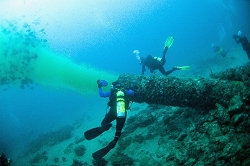
Typical Florida Inlet showing offset due to erosion of down-drift beach. Photo by Werner Bertsch |
House Bill 1427 – Inlet Management
This law mandates improved management of the state’s 56 navigational coastal inlets in order to restore the natural flow of sand along the shore. Engineered navigational inlets may cause up to 80% of the non-storm induced erosion along Florida’s east coast by disrupting the flow of sand along the shoreline. Recognizing this fact the legislature passed HB 1427. Since many of the inlets are adjacent to and cause the erosion of important sea turtle nesting beaches in Florida, this legislation will enhance the long term protection of those beaches. CCC has been researching this issue for two years, trying to gather support for new laws mandating a more aggressive approach to inlet management.
While the state already had a law requiring inlet management, it was largely being ignored. Since it was passed in 1986 only 17 Inlet Management Plans have been adopted for the state’s 56 inlets, and many of these plans have only been partially implemented. The last inlet plan adoption occurred 8 years ago. And. The 2008 inlet bill declares the state’s intent to recommit its beach management efforts to address beach erosion caused by the state’s navigation inlets. It declares that it is in the public’s interest to restore the natural flow of sand along the coast that has been disrupted by these inlets.
The new law directs that all beach quality sand disrupted by inlets must be placed onto adjacent eroding beaches. It requires that the Department of Environmental Protection take all reasonable actions to protect the state’s beaches by implementing inlet sand bypassing technologies to move the sand around the inlets and by utilizing the sand dredged from the inlets. This will potentially reduce the need for beach renourishment and increase the length of time between renourishment projects.
The bill also addresses inlet management plan development, the need for additional studies, funding and implementation priorities, and designates an “Inlet of the Year” from the three inlets chosen each year to receive management funding.
CCC would especially like to thank the Florida Shore and Beach Preservation Association, Senator Dennis Jones, and Representative Stan Mayfield for their leadership in ensuring the passage of this very important landmark beach legislation.

One of Florida’s Sewage Outfall Pipes dumping into the ocean. |
Senate Bill 1302 – Ocean Outfalls
As hard as it is to believe, the state has been allowing Palm Beach, Dade, and Broward counties in southeast Florida to dump 300 million gallons per day of partially treated residential wastewater directly into the ocean. The sewage is the most minimally treated allowable under Florida law and these are the only Florida counties allowed to dump it into the ocean. The result has been extensive degradation of Florida’s near shore coral reefs and the pollution of the marine environment. The three counties opposed this legislation. In the end common sense prevailed and compromises were accepted to ensure passage of the new law. Nonetheless, the law will greatly improve near shore marine water quality. This is good for sea turtles and other marine species.
The law establishes a detailed time line to end this practice of ocean dumping and mandates that these counties implement aggressive wastewater reuse strategies. The bill prohibits the construction of any new ocean outfall pipes in Florida, eliminates the six outfall pipes in these three counties, requires that these counties meet advanced waste water treatment guidelines by 2018, and essentially prohibits ocean dumping after 2025. CCC worked with the members of the Florida Coastal and Ocean Coalition, of which it is a member, to strongly support this legislation.
Senate Bill 542 – Florida Forever
This bill, championed by the conservation groups that made up the Florida Forever Coalition, extended and reauthorized funding for the Florida Forever land acquisition program. Funding at 300 million dollars a year was extended until 2020. This was a major accomplishment given the challenging budget shortfalls Florida is currently facing. SB 542 is a complicated piece of legislation with almost something for everyone interested in land acquisition in Florida.
CCC targeted its efforts on the protection of coastal habitats. While there will be considerable competition for Florida’s land acquisition dollars, CCC helped maintain a legislative focus on the need for coastal land acquisition. The new law requires the state land buying agency to develop a work plan to guide acquisition strategies. Of particular interest in that plan are new commitments to protect habitats for imperiled species, such as sea turtles, and a new focus on the need to purchase and protect coastal habitats and barrier island beaches.